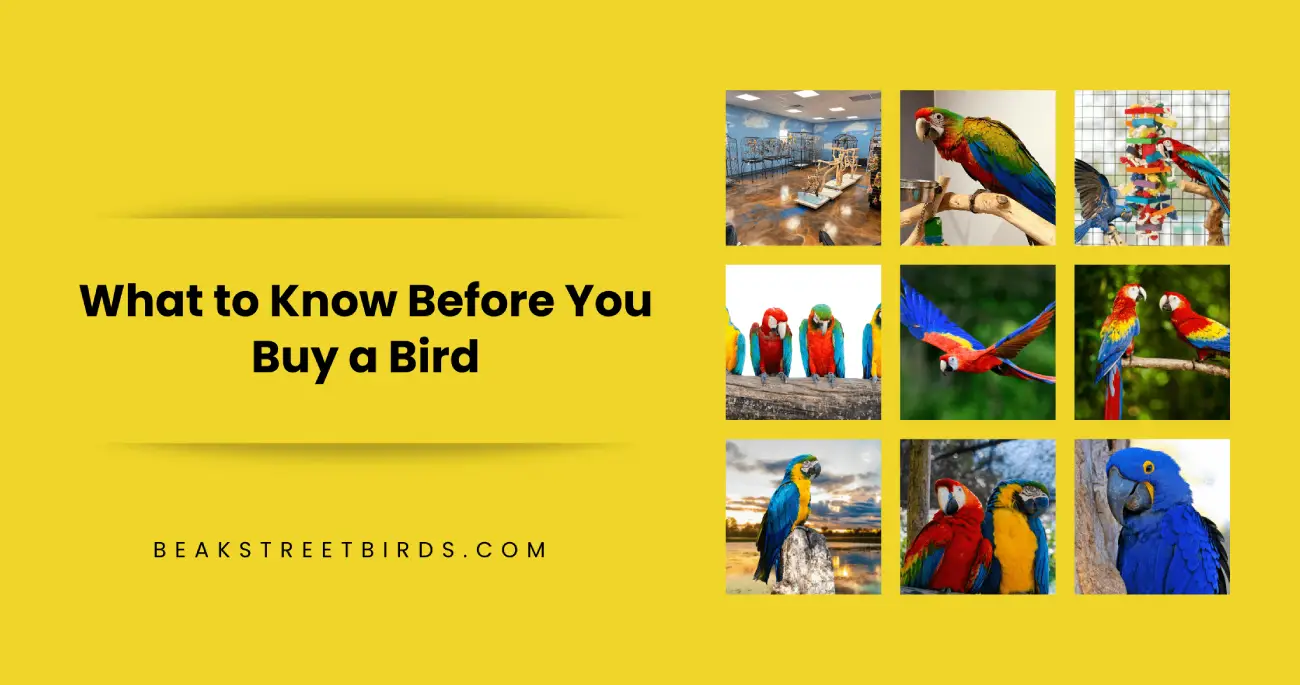
- Buying a Bird
- March 31, 2025
- No Comments
What to Know Before You Buy a Bird
Bringing home a bird can be an exciting and rewarding experience, but it’s important to understand the responsibilities that come with bird ownership. Birds are intelligent, social creatures that require proper care, attention, and commitment. Whether you’re considering a small parakeet or a majestic macaw, there are several factors to evaluate before making your decision. At Beakstreet Birds, we believe in educating potential bird owners to ensure they find the perfect feathered companion while providing the best care possible.
1. Choosing the Right Bird Species
Birds come in a wide variety of shapes, sizes, and personalities. It’s crucial to select a species that matches your lifestyle and experience level.
- Beginner-Friendly Birds: Parakeets (budgies), cockatiels, and finches are great options for first-time bird owners. They are relatively low-maintenance and easy to bond with.
- Advanced Options: Larger parrots such as African Greys, Amazons, and macaws require more time, space, and training due to their intelligence and long lifespans (up to 60 years).
Tip: Research the specific needs of the bird species you’re interested in, including diet, cage size, noise level, and socialization requirements.
2. Assessing Your Space
Birds need adequate space for their cages and room for exercise. The size of your home will determine the type of bird you can accommodate.
- Small birds like parakeets can thrive in tabletop cages.
- Larger birds like macaws require spacious floor-based cages or aviaries (minimum 42″x32″x75″).
Pro Tip: If possible, designate a room for your bird where they can safely fly and explore outside their cage.
3. Evaluating Your Commitment
Owning a bird is a long-term commitment that requires daily interaction, cleaning, and care. Birds thrive on routine and depend on their owners for emotional support and mental stimulation.
Ask yourself:
- Do I have time to interact with my bird every day?
- Can I afford regular vet visits, toys, food, and other supplies?
- Am I prepared for the mess (feathers, droppings) and noise (chirping or squawking)?
Remember: Some birds may outlive their owners due to their long lifespans.
4. Selecting a Healthy Bird
When purchasing a bird, it’s essential to ensure they are healthy:
- Bright eyes with no discharge from nostrils or beak.
- Clean feathers without puffing or damage.
- Active behavior—avoid birds that seem lethargic or huddled together.
- Clean feet free from injuries or excessive scaling.
Tip: Always request a wellness check from an avian veterinarian before bringing your bird home.
5. Preparing for Your New Feathered Friend
Before bringing your bird home, make sure you have everything ready:
- A spacious cage with appropriate bar spacing for their size.
- Perches of varying sizes for foot health.
- Toys for mental stimulation (e.g., chew toys, puzzle toys).
- A balanced diet including fruits, vegetables, seeds, pellets, and supplements like vitamin D.
Safety Note: Bird-proof your home by removing hazards like toxic plants, scented candles, and non-stick cookware.
6. Socialization & Training
Birds are highly social creatures that need regular interaction with their owners:
- Spend time talking to or playing with your bird daily to build trust and strengthen your bond.
- Train them using positive reinforcement techniques such as treats and praise for commands like “step-up.”
Tip: Larger parrots like African Greys or macaws may require advanced training due to their intelligence.
7. Financial Considerations
Bird ownership can be expensive beyond the initial purchase price:
- Cage costs range from $50 (small birds) to $1,000+ (large parrots).
- Food costs vary depending on species but typically range from $20-$50/month.
- Toys need regular replacement due to wear from chewing or shredding.
8. Why Choose Beakstreet Birds?
At Beakstreet Birds in Sachse, TX, we specialize in connecting bird lovers with healthy and well-socialized feathered companions. Our team is dedicated to educating new owners about proper care while offering high-quality resources such as custom seed mixes, toys, perches, and spacious cages.
We ensure all our birds are disease-tested and raised in loving environments so they’re ready to bond with their new families. Whether you’re looking for a beginner-friendly parakeet or an exotic macaw, Beakstreet Birds is here to help you find the perfect match!

